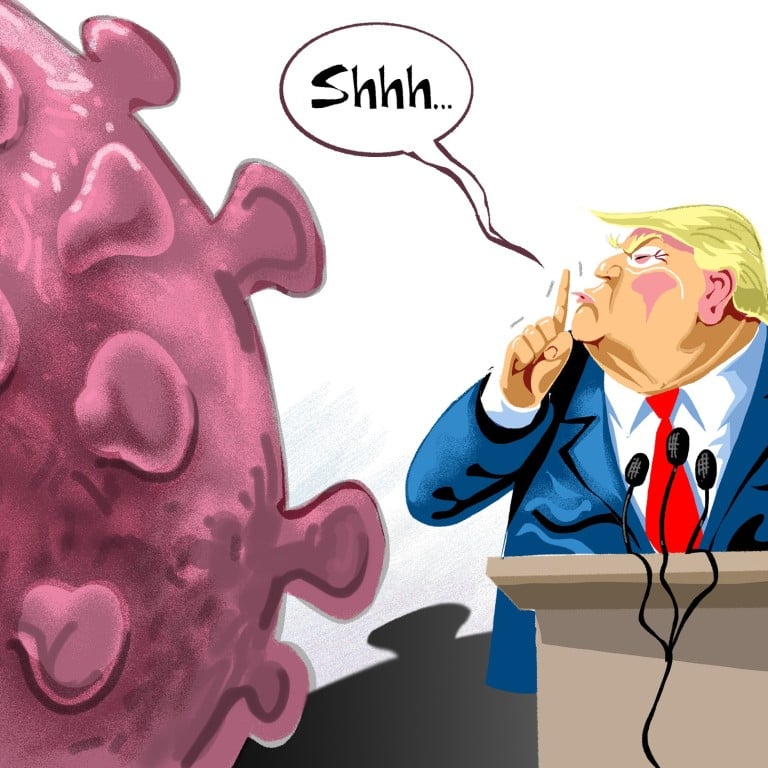
Coronavirus vs Trump: the US president’s authoritarian bluster has hit the cold, hard wall of a disease he can’t control
- From the Trump administration’s disbanding of the National Security Council’s epidemic response team to the president’s garbled messaging and the convoluted organisation of his coronavirus task force, the buck will finally stop at the very top
The White House response has mainly been to reassure everyone that all is fine and, in meeting after meeting, US President Donald Trump’s team praise him for his expert leadership.
Not only did Trump largely ignore this issue of domestic health monitoring, he had already eliminated positions within his National Security Council charged with coordinating an all-government response to epidemics.

Dr Anthony S. Fauci, director of the National Institute of Allergy and Infectious Diseases, who says he was not “muzzled”, had to cancel his speaking engagements on several Sunday talk shows and was replaced by Pence and Secretary of Health and Human Services Alex Azar, who then talked about the government response.
While Fauci has spoken publicly since – he was quoted in a Politico article saying, “You should never destroy your own credibility. And you don’t want to go to war with a president. But you got to walk the fine balance of making sure you continue to tell the truth” – Pence recently refused to give a press briefing open to recording for the nonsensical reason that Trump had already been on television a lot that day. Perhaps with less screen time for the president, Pence’s briefings are now allowed to be televised.
At a time when disseminating information to the public was critical, Trump relied again on his authoritarian instincts to censor. That would be expected from governments in Beijing or Moscow, but not in the US.
Coronavirus crisis? Trump’s bromance with Xi is going strong
Sensing the public mood turning against him, Trump, despite being in office for over three years, then blamed the former administration of Barack Obama for his own inability to get tests out sooner.
Already, over 2,700 people in New York are under voluntarily quarantine after one person was found infected. That one person led to four others, including family and a friend, which led to another family of five, which will inevitably lead to ever widening circles of potential exposure.
People who lose precious hourly work from quarantines won’t be seeking lower home mortgage rates. They are going to be worrying about two weeks without income, how to pay for food, next month’s rent, and potentially high medical costs should they end up being hospitalised.
Markets fall prey to ‘infodemic’ as technology fuels herd mentality
There is no doubt that large-scale outbreaks will also translate into lower economic activity, one of Trump’s main concerns next to stock market performance. His campaign pabulum on the great economy, low unemployment and a stock market at historic highs may not resonate for much longer.

Which brings us back to the fundamental flaw in authoritarian leadership that values control above all else. Trump can’t suppress the outbreak any more than he can steer a more than US$20 trillion economy into his re-election. His rhetoric and seemingly unstoppable will has hit the cold, hard fact wall of an epidemic.
America is facing down the coronavirus. And it’s not looking good
Blaming his vice-president is unlikely to work either. Trump placed him in charge of national coordination while leaving Alex Azar chairman of the task force, further contorting his dysfunctional organisation.
The blame game has, of course, already started, with Azar bearing the brunt of it after an ill-conceived and mismanaged roll-out of faulty testing kits, instructions for workarounds that didn’t work, and chronic shortages. The blame will eventually roll upwards the more Trump exposes his dangerous naivete and aimless leadership.
This is the relative dystopia that awaits the US as experts begin to prepare the public for an onslaught of positive cases that are sure to come. The White House should have been prepared to handle this epidemic and tamp down the unnecessary fear that has been allowed to grow unchecked.
There were three months of warning from the outbreak in China. Instead, Trump chose a power play, weakened his own institutions with staff cuts and cobbled together an inexpert team to manage a crisis that is quickly growing beyond their capabilities to manage and Trump’s ability to control.
Brian P. Klein (@brianpklein), a former US diplomat, is the founder and CEO of Decision Analytics, a New York-based strategic advisory and political risk firm

